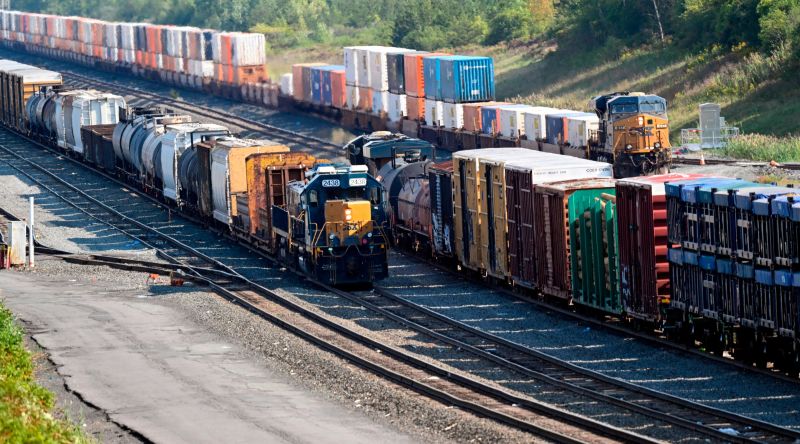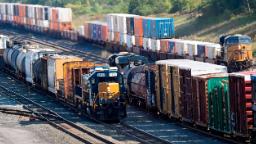

CNN
—
Union bosses and rail chiefs, called to Washington by the Biden administration, bargained deep into Wednesday evening to avert a national freight railroad strike for one simple reason – the consequences of a prolonged shutdown would be disastrous.
A nation still clawing its way back from a fragile and redefined sense of normality after the Covid-19 pandemic and facing the worst spikes in food prices since 1979 can’t afford yet another blow. An extended halt of the vast freight trains that snake across the prairies and north to Canada and south to Mexico could cause a full blown economic, social and political crisis – one with huge implications for President Joe Biden and Democrats ahead of November’s midterm elections.
A quarter of the way into the 21st century, it’s a little shocking that a rail network that most Americans probably don’t spare a thought for still forms an economic backbone of the nation. But the latest showdown is far from the only occasion in history when labor disputes in this critical industry have threatened nationwide disruption, and have turned into high-stakes political dramas as a result. Without freight rail, the country can’t properly function, as may become apparent in the weeks to come if frantic talks in Washington fail to find a solution to a dispute over working conditions for engineers and conductors and a strike goes ahead in the early morning hours of Friday.
The dispute may be focused on the railroads, but it is also emblematic of a wider trend in industrial relations in modern America, as workers squeezed in ventures pared back aggressively for maximum profit potential, from retail to health care to transportation, demand livable working conditions and turn to unions for help.
If the talks in Washington cannot reach a breakthrough, and a strike stretches beyond a week or so, the eventual repercussions could be dramatic.
Roughly 30% of America’s freight moves by rail. If vast trains, some with 240 wagons, don’t move, the country would need to find an impractical 80,000 truck drivers to make up the shortfall. It might seem counterintuitive, but a strike on the railways could send gasoline prices for cars soaring again. That’s because refineries will struggle to get sufficient crude oil from their rail deliveries. Recently harvested crops will be stuck, unable to reach processing plants and could spoil. Farm groups are already warning of the threat to fertilizer stocks that are transported by rail and needed for the next planting season. There could be shortages of food and other items in stores – and prices could rise again, adding to the current plague of inflation. New and used cars will be more expensive, if factories can’t get the parts they need for their assembly lines. And the ports that became clogged during the pandemic could again fill up, in a huge problem for the US economy that would quickly send shockwaves around the world.
If it were to last weeks, the strike could underscore yet again the tenuousness of the supply chain networks that are the foundation of modern life and how it doesn’t take long to incur serious damage.
These painful consequences, which could touch every American, explain why the talks in Washington brokered by Labor Secretary Marty Walsh are so important.
The talks involve two main unions locked in confrontation with railroad operators – the Brotherhood of Locomotive Engineers and Trainmen and SMART Transportation Division. Though Biden, a train buff, was more fixated on another mode of transport – cars – as he enjoyed a visit to the Detroit Auto Show on Wednesday, he personally called union leaders and rail companies earlier this week and he was briefed repeatedly Wednesday on the rail talks at the Labor Department as they stretched past the 12-hour mark. His team is working with shippers, truckers and air freight firms to see how other modes of transportation could keep moving if there is a strike.
A rail shutdown is not just a threat to the day-to-day lives of millions of Americans. It’s a huge problem for Biden and Democrats, first because they know that their brightening chances of staving off a Republican wave in the midterms could be dashed by another devastating shock to the economy that sends prices even higher and shatters the sense of normality that Biden pledged to restore. Another surge in inflation caused by a rail strike could also force the Federal Reserve to prolong its aggressive interest rate strategy, which is expected to go up another notch next week, and so raise the chances of an overcorrection that sends the economy into a recession.
The President, boosted by the passage of key congressional items, has been aggressively selling a story that America is back on the move again and that its economy is ready to roar. A rail strike could quickly tarnish his credibility in selling that narrative.
In a broader sense, the rail dispute pulls Biden between two competing strands of his political identity. He is the most-pro union president in decades. He needs the support of the movement to drive turnout in November and has no desire to be seen pressuring workers to accept a bad deal. On the other hand, the success of his entire presidency rests on getting inflation down and preventing Republicans from amassing Capitol Hill majorities that could make him a domestic lame duck.
Republicans, seeking to wrest the midterm debate back from the controversy over the Supreme Court’s overturning of abortion rights, already spot an opening in the rail dispute. The GOP tried and failed to pass a bill in the Senate that would enshrine deals most railway unions have made with companies and avert a strike.
“President Biden should have already resolved this himself. Democrats must let this pass,” Senate Minority Leader Mitch McConnell tweeted.
But some Democrats are unwilling to put pressure on unions. Although if a strike goes ahead, there will be extreme pressure on Congress to act to impose a solution in line with laws governing critical industries like freight rail. The GOP measure was in the end blocked by progressive Sen. Bernie Sanders, who’s twice run for the Democratic presidential nod. The Vermont independent blasted rail companies for making billions in profits and awarding their CEOs millions in compensation while imposing inhumane working conditions.
“The key issue in the current negotiations are not about salaries. They are about the working conditions in the industry which are absolutely unacceptable and almost beyond belief,” Sanders said, criticizing the lack of sick leave offered to some employees and a system that requires many to be on call for dispatch to work on trains 24 hours a day a day and seven days a week.
Arthur Wheaton, director of Labor Studies at the ILR Worker Institute of Cornell University, said that years of cost cutting and consolidation in the rail industry predated the pandemic and have led to the current impasse.
“The railways tried very hard to reduce headcount and actively reduce the number of people that they had working for them as a way to increase their profits or to have a higher return on investment so they could get more investment from Wall Street,” Wheaton said. But that paring down of manpower had caused a deterioration in the conditions for workers, who already faced long hours, and could raise safety concerns given the hazardous cargos some trains carry. The “on call” system mentioned by Sanders is at the center of the current dispute.
“That’s not sustainable for a family or sustainable for your health long term. You’d like to be able to go to bed knowing you don’t have to work for the next 12 hours, instead of saying, ‘Oh, I gotta wait and see if the phone rings,” Wheaton said.
The threatened railroad shutdown would be the first major strike in the industry since 1992, when Congress moved with unusual speed to end a labor stoppage after only two days amid severe economic consequences – including layoffs at mines that could no longer ship out their coal. The strike had shut down almost all goods and passenger rail in the country and, as with the current drama, threatened to become a political storm in an election year.
One question with this new dispute is whether an ever more polarized Congress could agree on terms for ending industrial action or whether the erupting economic crisis would leave rival lawmakers with no choice.
Throughout America’s industrial history in the 20th and 19th centuries, railroad strikes often broke out over poor wages or salary cuts or difficult and dangerous conditions. Often they were crushed by the government or industry barons, sometimes amid scenes of violence. But they are also written in the lore of the labor movement. And they also established leverage that is playing out in the current negotiations between unions and company bosses in Washington.
Then and now, the threat of closing down railroads for a sustained period conjures such dire economic repercussions that the dispute ends up becoming a major political issue that the nation’s leaders are ultimately called on to help solve – for their own good and everyone else’s.
